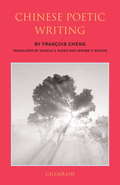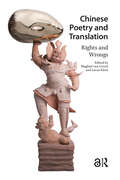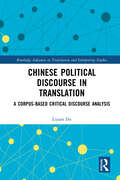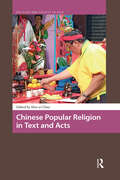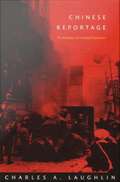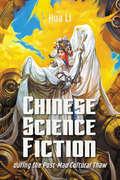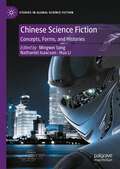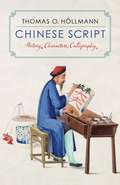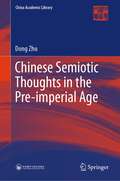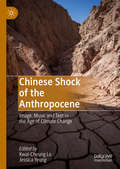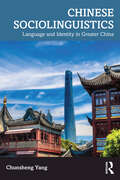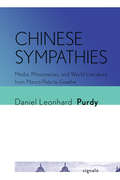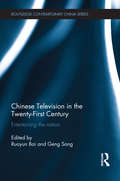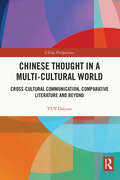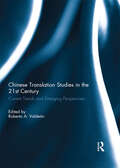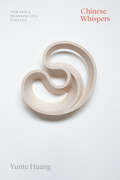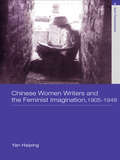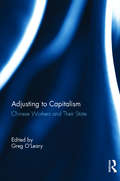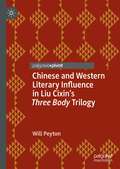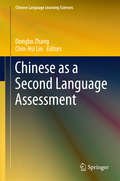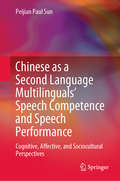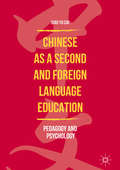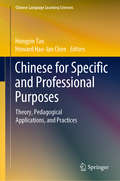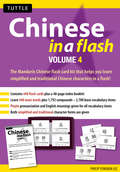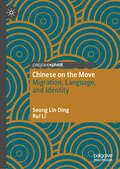- Table View
- List View
Chinese Poetic Writing
by Donald Riggs Francois Cheng Jerome SeatonThe most inovative study of Chinese poetry ever written, François Cheng's Chinese Poetic Writing--now in its first expanded, English-language edition--is an essential read for fans and scholars of Chinese literature and the art of poetry in general. Since its first publication in French in 1977, Chinese Poetic Writing has been considered by many to be the most innovative study of Chinese poetry ever written, as well as a profound and remarkable meditation on the nature of poetry itself. As the American poet Gustaf Sobin wrote, two years after the book’s appearance, “In France it is already considered a model of interdisciplinary research, a source book, and a ‘star’ in the very space it initially explored, traced, and elaborated.” Cheng illustrates his text with an annotated anthology of 135 poems he has selected from the Tang dynasty, presented bilingually, and with lively translations by Jerome P. Seaton. It serves as a book within the book, and an excellent introduction to the golden age of Tu Fu, Li Po, Wang Wei, and company. The 1982 translation, long out of print, was based on the first French edition. Since then, Cheng has greatly expanded the book. This is the first English-language edition of the expanded version, with the original translators returning to accommodate the many new additions and revise their earlier work.
Chinese Poetry and Translation: Rights and Wrongs
by Lucas Klein Maghiel Van CrevelChinese Poetry and Translation: Rights and Wrongs' offers fifteen essays on the triptych of poetry + translation + Chinese. The collection has three parts: The Translator's Take, Theoretics, and Impact. The conversation stretches from queer-feminist engagement with China's newest poetry to philosophical and philological reflections on its oldest, and from Tang- and Song-dynasty classical poetry in Western languages to Baudelaire and Celan in Chinese. Translation is taken as an interlingual and intercultural act, and the essays foreground theoretical expositions and the practice of translation in equal but not opposite measure. Poetry has a transforming yet ever-acute relevance in Chinese culture, and this makes it a good entry point for studying Chinese-foreign encounters. Pushing past oppositions that still too often restrict discussions of translation-form versus content, elegance versus accuracy, and the original versus the translated - this volume brings a wealth of new thinking to the interrelationships between poetry, translation, and China. Stretching from queer-feminist engagement with China’s newest poetry to philological reflection on its oldest, this book brings a wealth of new thinking to the interrelationships between poetry, translation, and China.
Chinese Political Discourse in Translation: A Corpus-based Critical Discourse Analysis (Routledge Advances in Translation and Interpreting Studies)
by Lijuan DuBuilding on Fairclough’s critical discourse analysis (CDA) framework, Du examines the official translators’ agency in reconstructing the image of China. Comparing the source text and target text, her book focuses on ideologically striking translation shifts that occur at different levels.Drawing on the Seven Reports to the National Congresses of the Communist Party of China (CPC) (1992-2022) as a corpus, Du explores the official translators’ agency in representing the image of China, as well as the recontextualization of the translated discourse of the Report to the National Congress of the CPC in the international media. She delves into the balance between discourse, ideology, and political and social function, and argues that at their essence, discourse changes by the translator represent a change of ideology, and the acquisition of discourse power is the manifestation of ideological power.Striking the balance between theoretical and empirical studies, this book reveals the role of discourse in building the media view of China, corroborating the interrelationship between discourse and ideology. The book will be of interest to researchers and postgraduate students of discourse analysis, corpus linguistics, and media studies.
Chinese Popular Religion in Text and Acts (Religion and Society in Asia)
by Shin-Yi ChaoThis volume explores practices and experiences in Chinese popular religion. The research adds new materials and new approaches to well-known worships such as the cults of doomsday, underworld, and Lord Guan on the one hand, and draws attention to under-the-radar deities and holy figures hiding in the mountainous countryside or among the urban crowd. While this book centers on Chinese popular religion, it will be of use to non-China scholars in folklore, religious art, and ritual studies as well as China scholars in popular culture from late-medieval to contemporary times.|The focus of our analysis is the discursive nature of Chinese popular religion. The enduing mutual interaction between institutional and popular religion is well captured in the analogy of reverberation that Paul Katz has first proposed. In addition, texts imply contexts. When studying texts, it is required to study the contexts in which the texts were generated, disseminated, received, and recreated as well as the agents who did all these. Popular religion as diffused religion in C.K. Yang's terminology is not a separate realm from society and religious history is, argues Barend ter Haar, an integrated part of general history. With texts as the starting point, this volume is historical in the scope while employing fieldworks in the approach. The contributors all have done their share of fieldworks in locating and collecting new primary texts such as stone inscriptions, folktales, and manuscripts. The ethnographical approach to history has been forcefully argued by historians like Daniel in a resumption of the interrupted folklore studies movement in China of the 1920s and 1930s. In the meantime, libraries and archives are by no means abandoned field for primary-source hunting. Newspapers, pamphlets, flyers, diaries and scriptures of both institutional and popular religion all have been keenly scrutinized in this volume.
Chinese Reportage
by Charles A. LaughlinChinese Reportage details for the first time in English the creation and evolution of a distinctive literary genre in twentieth-century China. Reportage literature, while sharing traditional journalism's commitment to the accurate, nonfictional portrayal of experience, was largely produced by authors outside the official news media. In identifying the literary merit of this genre and establishing its significance in China's leftist cultural legacy, Charles A. Laughlin reveals important biases that impede Western understanding of China and, at the same time, supplies an essential chapter in Chinese cultural history. Laughlin traces the roots of reportage (or baogao wenxue) to the travel literature of the Qing Dynasty but shows that its flourishing was part of the growth of Chinese communism in the twentieth century. In a modern Asian context critical of capitalism and imperialism, reportage offered the promise of radicalizing writers through a new method of literary practice and the hope that this kind of writing could in turn contribute to social revolution and China's national self-realization. Chinese Reportage explores the wide range of social engagement depicted in this literature: witnessing historic events unfolding on city streets; experiencing brutal working conditions in 1930s Shanghai factories; struggling in the battlefields and trenches of the war of resistance against Japan, the civil war, and the Korean war; and participating in revolutionary rural, social, and economic transformation. Laughlin's close readings emphasize the literary construction of social space over that of character and narrative structure, a method that brings out the critique of individualism and humanism underlying the genre's aesthetics. Chinese Reportage recaptures a critical aspect of leftist culture in China with far-reaching implications for historians and sociologists as well as literary scholars.
Chinese Science Fiction during the Post-Mao Cultural Thaw
by Hua LiThe late 1970s to the mid-1980s, a period commonly referred to as the post-Mao cultural thaw, was a key transitional phase in the evolution of Chinese science fiction. This period served as a bridge between science-popularization science fiction of the 1950s and 1960s and New Wave Chinese science fiction from the 1990s into the twenty-first century. Chinese Science Fiction during the Post-Mao Cultural Thaw surveys the field of Chinese science fiction and its multimedia practice, analysing and assessing science fiction works by well-known writers such as Ye Yonglie, Zheng Wenguang, Tong Enzheng, and Xiao Jianheng, as well as the often-overlooked tech–science fiction writers of the post-Mao thaw. Exploring the socio-political and cultural dynamics of science-related Chinese literature during this period, Hua Li combines close readings of original Chinese literary texts with literary analysis informed by scholarship on science fiction as a genre, Chinese literary history, and media studies. Li argues that this science fiction of the post-Mao thaw began its rise as a type of government-backed literature, yet it often stirred up controversy and received pushback as a contentious and boundary-breaking genre. Topically structured and interdisciplinary in scope, Chinese Science Fiction during the Post-Mao Cultural Thaw will appeal to both scholars and fans of science fiction.
Chinese Science Fiction: Concepts, Forms, and Histories (Studies in Global Science Fiction)
by Hua Li Nathaniel Isaacson Mingwei SongThis volume brings together emerging approaches and addresses shifting paradigms in Chinese science fiction studies, offering a window on fan cultures, internet fiction, gender, eco-criticism, post-humanism and biomedical discourse. These studies present a “second wave” of Chinese sf studies, re-evaluating the canon of Chinese sf print and cinematic production, and expand the range of critical approaches to the subject. The structure of the volume is both chronological and theme-focused. These studies also demonstrate that Chinese science fiction represents a significant contribution to modern Chinese cultural production, both in terms of its value, speaking powerfully to our modern condition, and its sheer volume in terms of production and consumption. Chinese science fiction speaks to both China’s rapidly shifting reality, its political multiplicity and its formless future, voicing the anticipations and anxieties of a new epoch filled with accelerating alterations and increasing uncertainty.
Chinese Script: History, Characters, Calligraphy
by Thomas O. HöllmannIn this brisk and accessible history, sinologist Thomas O. Höllmann explains the development of the Chinese writing system and its importance in literature, religion, art, and other aspects of culture. Spanning the earliest epigraphs and oracle bones to writing and texting on computers and mobile phones today, Chinese Script is a wide-ranging and versatile introduction to the complexity and beauty of written text and calligraphy in the Chinese world.Höllmann delves into the origins of Chinese script and its social and political meanings across millennia of history. He recounts the social history of the writing system; written and printed texts; and the use of writing materials such as paper, silk, ink, brush, and printing techniques. The book sheds light on the changing role of literacy and education; the politics of orthographic reform; and the relationship of Chinese writing to non-Han Chinese languages and cultures. Höllmann explains the inherent complexity of Chinese script, demonstrating why written Chinese expresses meaning differently than oral language and the subtleties of the relationship between spoken word and written text. He explores calligraphy as an art, the early letter press, and other ways of visually representing Chinese languages. Chinese Script also provides handy illustrations of the concepts discussed, showing how ideographs function and ways to decipher them visually.
Chinese Semiotic Thoughts in the Pre-imperial Age (China Academic Library)
by Dong ZhuThis book examines practices on the relationship between sign and meaning in the Pre-Imperial period of China from the semiotics perspective. Although the Chinese civilization did not develop a comprehensive semiotics system in that period, they are highly semiotic in many ways. The thinking and application of signs of Chinese people can be found in many classics, such as The Book of Changes, The Analects of Confucius, Tao De Jing and Zhuangzi. This book begins its study by re-examining the semiotic thoughts contained in The Book of Changes and inquiries into the thoughts of the major philosophers of different schools. It provides insights into the findings of these philosophers concerning the relationship between sign and meaning. In particular, it concentrates on how the prosperity of the various contending semiotic thoughts complemented each other in forming a sign system. In addition, the book also emphasizes the wholeness and associativity of observing things and studying relevant signs of Chinese people. As the first monograph in any language to systematically summarize Chinese semiotic thought in the Pre-Imperial period, this book helps promote understanding of the traditional Chinese culture and mindset.
Chinese Shock of the Anthropocene: Image, Music and Text in the Age of Climate Change
by Kwai-Cheung Lo Jessica YeungThis book examines China’s role and its cultural productions in the process of environmental destruction and transformation, focusing on how various cultural media play a significant role in shaping and reproducing Chinese subject formation in relation to changing ecological conditions. It argues that China under the leadership of Xi Jinping vowed in 2017 to play a leading role in preserving the planet for the future, but many of its actions such as its “Belt and Road” initiative have aroused apprehension rather than inspired confidence. Against this backdrop of environmental concern, this volume brings together a cutting-edge critical analysis of Chinese literature, music and cinema, offering a transdisciplinary and comprehensive vision of Chinese arts and literature under the current conditions of the Anthropocene. This volume sets a high scholarly standard in the field, and constitutes a valuable reference for scholars and students of Chinese cultural studies, Chinese studies and Anthropocene studies.
Chinese Sociolinguistics: Language and Identity in Greater China
by Chunsheng YangChinese Sociolinguistics examines the ways in which language contributes to shaping social, cultural, and ethnic identities in Greater China. This book is the first textbook to be exclusively devoted to the issues of language, society, and identity in mainland China, Taiwan, Hong Kong, Singapore, and overseas Chinese communities (the Greater China). The book includes topics on the role of language in Chinese culture; the linguistic indexing of socioeconomic class; dialects and regional language variation; the impacts of state policies; linguistic borrowings; bilingualism and bicultural identity; and language shift and attrition. The emergence of new forms of language as influenced by modern technologies and possible future developments is also discussed in this book. This book will appeal to undergraduate and graduate students taking courses in Chinese sociolinguistics, particularly with a focus on language, identity, and society in Greater China. This book will also be of interest to members of the Chinese Language Teachers Association and the American Council of Teaching Foreign Languages (ACTFL).
Chinese Sympathies: Media, Missionaries, and World Literature from Marco Polo to Goethe (Signale: Modern German Letters, Cultures, and Thought)
by Daniel Leonhard PurdyChinese Sympathies examines how Europeans—German-speaking writers and thinkers in particular—identified with Chinese intellectual and literary traditions following the circulation of Marco Polo's Travels. This sense of affinity expanded and deepened, Daniel Leonhard Purdy shows, as generations of Jesuit missionaries, baroque encyclopedists, Enlightenment moralists, and translators established intellectual regimes that framed China as being fundamentally similar to Europe. Analyzing key German literary texts—theological treatises, imperial histories, tragic dramas, moral philosophies, literary translations, and poetic cycles—Chinese Sympathies traces the paths from baroque-era missionary reports that accommodated Christianity with Confucianism to Goethe's concept of world literature, bridged by Enlightenment debates over cosmopolitanism and sympathy, culminating in a secular principle that allowed readers to identify meaningful similarities across culturally diverse literatures based on shared human experiences.Thanks to generous funding from Penn State University, the ebook editions of this book are available as Open Access volumes from Cornell Open (cornellopen.org) and other repositories.
Chinese Television in the Twenty-First Century: Entertaining the Nation (Routledge Contemporary China Series)
by Ruoyun Bai Geng SongThe past two decades witnessed the rise of television entertainment in China. Although television networks are still state-owned and Party-controlled in China, the ideological landscape of television programs has become increasingly diverse and even paradoxical, simultaneously subservient and defiant, nationalistic and cosmopolitan, moralistic and fun-loving, extravagant and mundane. Studying Chinese television as a key node in the network of power relationships, therefore, provides us with a unique opportunity to understand the tension-fraught and , paradox-permeated conditions of Chinese post-socialism. This book argues for a serious engagement with television entertainment. rethinking, It addresses the following questions. How is entertainment television politically and culturally significant in the Chinese context? How have political, industrial, and technological changes in the 2000s affected the way Chinese television relates to the state and society? How can we think of media regulation and censorship without perpetuating the myth of a self-serving authoritarian regime vs. a subdued cultural workforce? What do popular televisual texts tell us about the unsettled and reconfigured relations between commercial television and the state? The book presents a number of studies of popular television programs that are sensitive to the changing production and regulatory contexts for Chinese television in the twenty-first century. As an interdisciplinary study of the television industry, this book covers a number of important issues in China today, such as censorship, nationalism, consumerism, social justice, and the central and local authorities. As such, it will appeal to a broad audience including students and scholars of Chinese culture and society, media studies, television studies, and cultural studies.
Chinese Thought in a Multi-cultural World: Cross-Cultural Communication, Comparative Literature and Beyond (China Perspectives)
by YUE DaiyunReflecting on the “clash of civilizations” as its point of departure, this book is based on a series of sixteen of the author’s interconnected, thematically focused lectures and calls for new perspectives to resist imperialistic homogeneity. Situated within a neo-humanist context, the book applies interactive cognition from an Asian perspective within which China can be perceived as an essential “other,” making it highly relevant in the quest for global solutions to the many grave issues facing humankind today. The author critiques American, European, and Chinese points of view, highlighting the significance of difference and the necessity of dialogue, before, ultimately, rethinking the nature of world literature and putting forward interactive cognition as a means of “reconciliation” between cultures. Chinese culture, as a frame of reference endowed with traditions of “harmony without homogeneity”, may help to alleviate global cultural confrontation and even reconstruct the understanding of human civilization. The book will be essential reading for scholars and students of Comparative Literature, Chinese Studies, and all those who are interested in cross-cultural communication and Chinese culture in general.
Chinese Translation Studies in the 21st Century: Current Trends and Emerging Perspectives
by Roberto A. ValdeónChinese Translation Studies in the 21st Century, which presents a selection of some of the best articles published in the journal Perspectives in a five-year period (2012-2017), highlights the vitality of Translation Studies as a profession and as a field of enquiry in China. As the country has gradually opened up to the West, translation academic programmes have burgeoned to cater for the needs of Chinese corporations and political institutions. The book is divided into four sections, in which authors explore theoretical and conceptual issues (such as the connection between translation and adaptation, multimodality, and the nature of norms), audiovisual translation (including studies on news translation and the translation of children’s movies), bibliographies and bibliometrics (to assess, for example, the international visibility of Chinese scholars), and interpreting (analyzing pauses in simultaneous interpreting and sign language among other aspects). The book brings together well-established authors and younger scholars from universities in mainland China, Hong Kong, Macao and Taiwan.The chapters in this book were originally published in various issues of Perspectives: Studies in Translatology.
Chinese Whispers: Toward a Transpacific Poetics (Thinking Literature)
by Yunte HuangChinese Whispers examines multiple contact zones between the Anglophone and Sinophone worlds, investigating how poetry both enables and complicates the transpacific production of meaning. In this new book, the noted critic and best-selling author Yunte Huang explores the dynamics of poetry and poetics in the age of globalization, particularly questions of translatability, universality, and risk in the transpacific context. “Chinese whispers” refers to an American children’s game dating to the years of the Cold War, a period in which everything Chinese, or even Chinese sounding, was suspect. Taking up various manifestations of the phrase in the twentieth and twenty-first centuries, Huang investigates how poetry, always to a significant degree untranslatable, complicates the transpacific production of meanings and values. The book opens with the efforts of I. A. Richards, arguably the founder of Anglo-American academic literary criticism, to promote Basic English in China in the early twentieth century. It culminates by resituating Ernest Fenollosa’s famous essay “The Chinese Written Character as a Medium for Poetry,” exploring the ways in which Chinese has historically enriched but also entrapped the Western conception of language.
Chinese Women Writers and the Feminist Imagination, 1905-1948
by Haiping YanChinese Women Writers and the Feminist Imagination, 1905-1948 provides a compelling study of leading women writers in modern China, charting their literary works and life journeys to examine the politics and poetics of Chinese transcultural feminism that exceed the boundaries of bourgeois feminist selfhood. Unlike recent literary studies that focus on the discursive formation of the modern Chinese nation state and its gendering effects, Haiping Yan explores the radical degrees to which Chinese women writers re-invented their lives alongside their writings in distinctly conditioned and fundamentally revolutionary ways. The book draws on these women's voluminous works and dramatic lives to illuminate the range of Chinese women's literary and artistic achievements and offers vital sources for exploring the history and legacy of twentieth-century Chinese feminist consciousness and its centrality in the Chinese Revolution. It will be of great interest to scholars of gender studies, literary and cultural studies and performance studies.
Chinese Workers and Their State: Adjusting to Capitalism
by Greg O'LearyThis text examines the most economically critical and politically sensitive issues of China's reform process - labour market development, changing industrial relations, and labour-state and labour-capital conflict. It suggests that a system is emerging in China which is a form of capitalism.
Chinese and Western Literary Influence in Liu Cixin’s Three Body Trilogy (Studies in Global Science Fiction)
by Will PeytonChinese and Western Literary Influence in Liu Cixin’s Three Body Trilogy examines Liu Cixin’s acclaimed trilogy, a Chinese science fiction epic whose translation is exceedingly popular in the Western world. Will Peyton argues that the ingenuity of Liu’s writing is found in its conscious engagement with translated Western fiction rather than, as one might expect, in Chinese language science fiction of the past. The book illustrates how contemporary Chinese fiction, since the economic opening of China in the late 1980s, is deeply and complexly influenced by various strains in Western literary and intellectual thought, an area that scholars of Chinese literature have tended to neglect. Providing a lucid and succinct close-reading and textual analysis of Three Body trilogy, the book also makes reference to broader ideas and themes in modern Chinese and Western intellectual history.
Chinese as a Second Language Assessment (Chinese Language Learning Sciences)
by Dongbo Zhang Chin-Hsi LinThis book brings together 13 original research papers that address emerging issues in the assessment of Chinese as a Second Language (CSL) in five major areas, including standards in CSL assessment; development of CSL tests; assessment of diverse knowledge and skills; computer-supported assessment; and CSL assessment in relation to instruction and teachers' assessment competence. It goes beyond the psychometric testing of Chinese and provides cutting-edge examinations of the interfaces of assessment with sociology of language, acquisition, pedagogy, and modern technologies, as well as teacher education. Given its unique features and broad range of topics, the book offers an intriguing and valuable resource, not only for scholars and researchers but also teacher educators and assessment practitioners who are directly or indirectly involved in CSL assessment.
Chinese as a Second Language Multilinguals’ Speech Competence and Speech Performance: Cognitive, Affective, and Sociocultural Perspectives
by Peijian Paul SunThis book offers a comprehensive and systematic review of multilingual L2 learners’ spoken Chinese, focusing on the dual dimensions of speech competence and speech performance. Specifically, by adopting a mixed-methods approach, it explores the cognitive, affective, and socio-cultural differences between intermediate and advanced multilingual learners’ L2 Chinese speech competence and speech performance. Drawing on a theoretical framework underpinned by the affective filter hypothesis, L2 willingness to communicate model, L2 motivational self-system, and L2 speech production models, this book not only contributes to our theoretical understanding of the roles of various factors in L2 Chinese speech competence and speech performance, but also offers practical insights into the implications for both teachers and learners in terms of how to minimize the gap between these two dimensions among L2 Chinese learners. It concludes with a discussion on the limitations of L2 Chinese speech and on future directions for the field.
Chinese as a Second and Foreign Language Education: Pedagogy and Psychology
by Qiao Yu CaiThis book presents key issues in the teaching of Chinese as a second or foreign language (TCSL or TCFL). It investigates how multimedia can help to assist TCSL/TCFL and explores practical effects of multimedia-assisted teaching at secondary schools in the Philippines. It addresses the psychology of TCSL/TCFL and discusses various recurring foreign graduate students concerns when learning academic Chinese in graduate institutes in Taiwan. It examines issues of educational assessment and testing, analyzing the validity of a self-made placement test for an immigrant Chinese program, as well as the psychological characteristics of adult learners and their implications for immigrant Chinese curriculum design. As foreign learners of Chinese grow exponentially, this cutting edge read conceptualizes the educational philosophy of TCSL/TCFL as a distinctive discipline.
Chinese for Specific and Professional Purposes: Theory, Pedagogical Applications, and Practices (Chinese Language Learning Sciences)
by Hongyin Tao Howard Hao-Jan ChenThis book, likely the first of its kind in the English language, explores Chinese for specific and professional purposes (CSP) in terms of theorizing and developing practical applications for language teaching and learning. While research in language for specific purposes is thriving for languages such as English, there has been comparatively little such research conducted for Chinese. This volume attempts to fill the gap by bringing together practitioners from a broad international scholarly community, who share common interests yet diverse orientations. Seventeen papers are included, and address four broad thematic categories: (1) academic Chinese, (2) business Chinese, (3) Chinese for medicine and health care, and (4) Chinese for other broadly defined services and industries (diplomacy, tourism, wine-tasting, etc.). Representing the state of the art in CSP research, the book offers an indispensable guide for anyone interested in theoretical and practical issues in this area of applied Chinese language studies.
Chinese in a Flash Volume 4
by Philip Yungkin LeeChinese in a Flash Volume 4 continues to provide more resources for Chinese language students wishing to learn Chinese quickly and easily. This unique set of Chinese flash cards enables learners to acquire more Chinese words and their derivatives in an easy-to-use manner, at a pace to be set by the learners themselves. Common idiomatic expressions are widely distributed among the cards; learners who master these will come to appreciate the beauty of the Chinese language by using a few words to say a thousand different things.
Chinese on the Move: Migration, Language, and Identity
by Rui Li Seong Lin DingThis book is the first to study the language and politics of identity of recent mainland Chinese migrants to Malaysia. Drawing on a variety of fieldwork data, the volume provides an accessible and succinct view of this &‘new&’ transnational migrant community in multilingual Malaysia. Unlike earlier Chinese migrants (the &‘old&’ Chinese communities) who migrated to Malaysia (previously British Malaya) due to experiencing poverty in China, the &‘new&’ Chinese community in Malaysia comprises mainly students, professionals, migrants who participated in the Malaysia My Second Home (MM2H) programme and individuals who married locals. This book focuses on the experiences of these new migrants from mainland China, how they were received in Malaysian society, the language problems and barriers they faced, their language accommodation and potential linguistic dislocation, their attitudes and identities, whether these shifted over time, and the (in)visibility and social inclusion of these migrants in Malaysian society. It also offers insights and understanding of the dynamic and complex nature of how migrants are inclined towards their &‘home&’ country while adapting to their &‘host&’ society. This book enriches the literature on language use and adaptation in Chinese diaspora communities throughout the world, as well as the politics of language and identity, and it will be of interest to students and scholars of Sociolinguistics, Chinese studies, Asian studies, Migration studies, and Southeast Asian studies.
